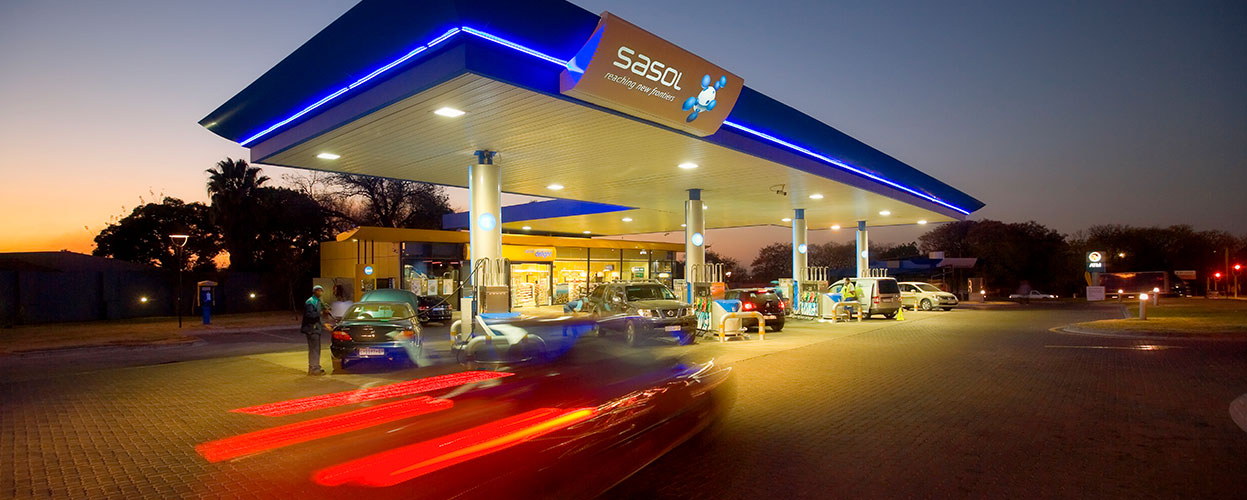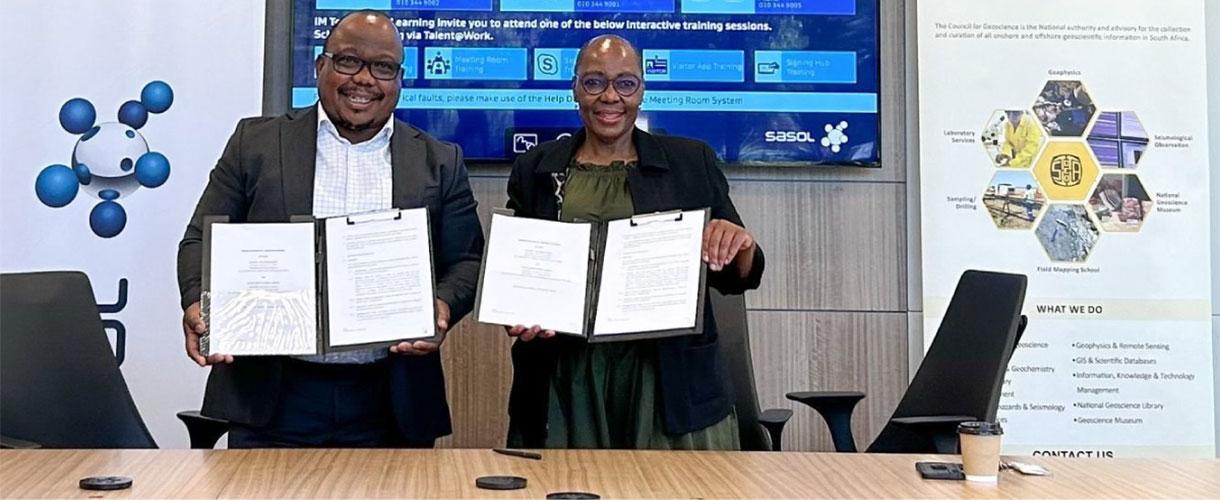- Home
-
Who We Are

Overview
Sasol is a global chemicals and energy company. We harness our knowledge and expertise to integrate sophisticated technologies and processes into world-scale operating facilities. We safely and sustainably source, produce and market a range of high-quality products, creating value for stakeholders.
-
Our Businesses

Overview
Through proprietary technologies and processes the main products Sasol produces are fuel components, chemical components and co-products. From these main products and further value-adding processes we deliver diesel, petrol (gasoline), naphtha, kerosene (jet fuel), liquid petroleum gas (LPG), olefins, alcohols, polymers, solvents, surfactants, co-monomers, ammonia, methanol, crude tar acids, sulphur, illuminating paraffin, bitumen and fuel oil. Even further processing produces numerous additional products.
-
ESG

Overview
Advancing chemical and energy solutions that contribute to a thriving planet, society and enterprise.
-
Investor Centre

Overview
Sasol's investors consist of both equity investors (those invested in the Sasol ordinary shares or the ADRs) and lenders/debt investors (banks and institutional investors lending to Sasol or investing in its issues of debt instruments such as local bonds, offshore bonds, commercial paper issues, project finance, loans and other credit facilities and convertible instruments).
-
Suppliers
- North America
- Sasol Supplier Landscape and Guiding Principles
- Supplier Environment, Social and Governance (ESG)
- Become A Supplier
- Service Provider Safety Management
- Enterprise And Supplier Development
- Existing Supplier Portal
- Contract Terms And Conditions
- Important Links
- Supply Chain Fraud Alert
- Sasol EthicsLine

Overview
Supply Chain is the custodian of all external spend for the Sasol Group. It is responsible for managing supply and demand so as to ensure cost-efficiency and maximise return on spend, while at the same time ensuring effective logistics of a range of deliverables.
-
Careers

Overview
Explore existing opportunities to energise your career to the next level. Whether you are seeking a Learnership or you are Student or Graduate or Experienced Hire. Find out how you can add value to the Sasol Team.
-
Media Centre

Overview
Access media releases and view latest social media updates
- Contact Us
Council for Geoscience and Sasol collaborate to advance CCUS research in South Africa
Council for Geoscience and Sasol collaborate to advance CCUS research in South Africa
Stores
|
Total Stores |
Division |
Store Location |
Address |
Tel No |
|
1 |
Relabelled |
Salt River |
29 Brickfield Road, Salt River, Cape Town |
(021)4479913 |
|
2 |
Relabelled |
Bellville |
Shop 4, Corner Voortrekker Rd & Durban RD, Bellville |
(021)9171860 |
|
3 |
Relabelled |
Kenilworth |
Unit number 3 access park, Chichester road, Kenilworth |
(021)6714778, |
|
4 |
Relabelled |
Kuilsrivier |
Shop 4 & 5 Access Park, Kuilsrivier |
(021)9031294 061 287 3980 |
|
5 |
Relabelled |
Mobeni |
Cnr Grimsby & Leicester Rd, Mobeni, Durban |
(031)4620540 W\House (031) 469 9409 |
|
6 |
Relabelled |
Pier 14 |
21A Pier 14, Shopping Centre, Port Elizabeth |
(041)4841575 083 5176 728 |
|
7 |
Relabelled |
Marlboro |
13 Sparten Crescent ,Marlboro , Ext 3 Johannesburg |
(011) 262 0460 |
|
8 |
Relabelled |
Soweto |
Maponya Shop 200 2127 Chris hani Road, klipspruit ext5 Soweto |
(011) 933 1023 |
|
9 |
Relabelled |
Umlazi |
Shop 155 Umlazi Mega City 50 Griffiths Mxenge Highway Umlazi |
(031) 902 1325 |
|
10 |
Relabelled |
Epping |
10 Losack avenue , epping industrial |
(021) 534 0401 |
|
1 |
BCWC |
Kloof |
Lifes on Kloof, 50 Kloof Street, Gardens ,Cape Town, shop G-15 |
(021) 422 1593 078 211 8051 |
|
2 |
BCWC |
Canal Walk |
Shop 619 Canal Walk , Century BLVD, Century City , Cape Town 7441 |
(021) 551 2891 |
|
3 |
BCWC |
Monte Casino |
Shop 80B Montecasino, No1 Monticasino Bouelvard Fourways , 2191 Magents |
(011) 465 0438 |
|
4 |
BCWC |
Menlyn |
Shop UF 42 & 43 cnr atterbury road & lois avenue , menlo park , Pretoria |
(012) 764 9600 |
|
5 |
BCWC |
Balito |
SHOP 608 LEONORA DRIVE,DOLPHIN COAST,BALLITO,4399 |
032 586 0242 |
|
6 |
BCWC |
Rosebank |
Shop GF08, The Zone, Rosebank mall, Oxford Street, Johannesburg |
(011)268 1114 |
|
1 |
Magents |
Canal Walk |
Shop 08 , Century Blvd , Century City 7441 |
(021) 551 2533 JP CELL: 064 686 4026 |
|
2 |
Magents |
Monte Casino |
Shop 21 Montecasino, No1 Monticasino Bouelvard Fourways , 2191 Magents |
(011) 465 6721 074 669 6310 073 804 4352 079 884 7607 |
|
3 |
Magents |
Menlyn |
MENLYN MALL , SHOP G190 CNR ATTERBURY ROAD & LOIS AVENUE,MENLO PARK,PRETORIA |
(012) 348 4725 073 8677 468 - Sieya , kiley , OUPA, Micheal |
|
4 |
Magents |
Balito |
SHOP 608 LEONORA DRIVE,DOLPHIN COAST,BALLITO,4399 |
061 521 7446 032 586 1467 |
|
1 |
WSA |
Menlyn |
MENLYN MALL ,LF41A CNR ATTERBURY ROAD & LOIS AVENUE,MENLO PARK,PRETORIA |
Vicky - 078 816 1921 land line - 012 348 4766 |
|
6 |
BCWC |
Rosebank |
Shop GF08, The Zone, Rosebank mall, Oxford Street, Johannesburg |
(011)268 1114 |
|
1 |
Magents |
Canal Walk |
Shop 08 , Century Blvd , Century City 7441 |
(021) 551 2533 JP CELL: 064 686 4026 |
|
2 |
Magents |
Monte Casino |
Shop 21 Montecasino, No1 Monticasino Bouelvard Fourways , 2191 Magents |
(011) 465 6721 074 669 6310 073 804 4352 079 884 7607 |
|
3 |
Magents |
Menlyn |
MENLYN MALL , SHOP G190 CNR ATTERBURY ROAD & LOIS AVENUE,MENLO PARK,PRETORIA |
(012) 348 4725 073 8677 468 - Sieya , kiley , OUPA, Micheal |
|
4 |
Magents |
Balito |
SHOP 608 LEONORA DRIVE,DOLPHIN COAST,BALLITO,4399 |
061 521 7446 032 586 1467 |
|
1 |
WSA |
Menlyn |
MENLYN MALL ,LF41A CNR ATTERBURY ROAD & LOIS AVENUE,MENLO PARK,PRETORIA |
Vicky - 078 816 1921 land line - 012 348 4766 |

Council for Geoscience and Sasol collaborate to advance CCUS research in South Africa

The Council for Geoscience (CGS) and Sasol have signed a Memorandum of Understanding (MoU) to collaborate, explore and develop carbon capture and utilisation and storage (CCUS) potential in South Africa. This collaboration marks another step in accelerating the trajectory towards achieving a low-carbon economy through strategic and cooperative initiatives.
This agreement will leverage on the expertise and experience of both the public and private sectors and deploy CCUS research and innovation towards commercial viability and scalability in South African conditions. The CCUS project is one of the climate change mitigation programmes co-funded by the South African government and World Bank in South Africa.
The MoU further provides a framework for developing a deeper understanding of the geological potential for CO2 sequestration, both onshore and offshore as pointed out by the Atlas on the geological storage of carbon dioxide in South Africa and cost requirements for CO2 sequestration.
CCUS can capture more than 85% of carbon dioxide emissions from power plants and industrial facilities such as the Sasol coal-to-liquids plant in Secunda.
The CGS CEO, Mr. Mosa Mabuza, said “The government of South Africa has a long-shared history on matters of CCUS with Sasol and the timing for this collaboration is impeccable given the energy crisis confronting the country”. The CCUS intervention is poised to play a quintessential role on fossil fuel as one of energy sources in South Africa for the foreseeable future, he added.
“We are pleased to partner with CGS in exploring this nascent area that holds significant potential in enabling Sasol’s decarbonisation objectives. It marks another step in our journey towards our 2050 net zero ambitions, where we believe CCUS will have a role to play,” added Dr Thembakazi Mali, Senior Vice President for Research and Technology at Sasol Energy.
The CCUS programme is one of the suites of technologies implemented in line with South Africa’s climate change commitments to reduce its carbon dioxide emissions by 50% in 10 years’ time, aligned to the Paris Agreement.
The CGS is one of the national science councils in South Africa established under the Geoscience Act, (Act. No. 100 of 1993) as amended. It is the custodian of all onshore and offshore geoscience data and information, and is mandated to promote research, extend knowledge in the field of geoscience as well as provide specialised geoscientific services.

